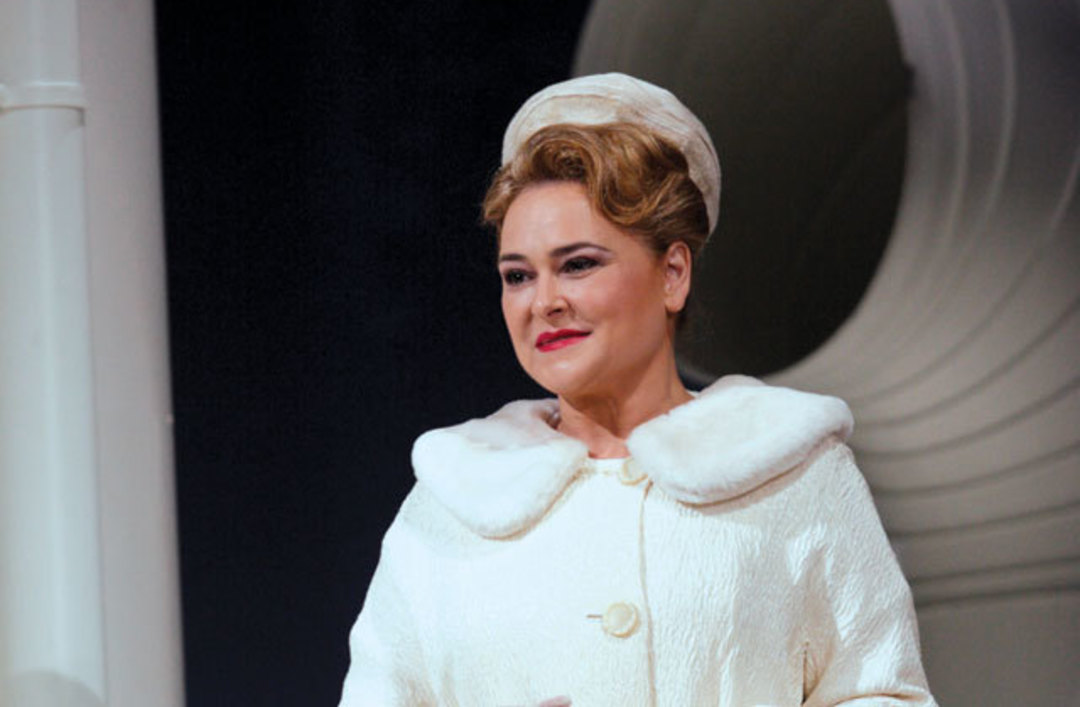HGO Remembers a Forgotten Russian Opera
In 1968, Russian composer Mieczyslaw Weinberg, a protégé of Dmitri Shostakovich, wrote Passazhierka—The Passenger—based on a Polish radio play. Set on an ocean liner sailing from Europe to South America in the years after World War II, the opera depicts a German couple: Walter, a West German diplomat heading for a new posting in Brazil, and his new wife Liese. Unknown to Walter, Liese has a secret; during the war, she worked as an SS guard at Auschwitz, where she oversaw the slaughter of hundreds of thousands of Jews.
Like other Nazi war criminals, Liese hopes to escape her past by resettling in another part of the world. But during the ocean voyage, she spots a passenger who resembles an inmate at Auschwitz whom she thought had died in the gas chamber, and her crimes come back to haunt her. As Liese tries to ascertain the woman’s identity, the opera flashes back to scenes from the concentration camp, where we learn the complicated backstories of the two women.
Such a story would seem to have all the ingredients for powerful opera, but the Soviet authorities, strongly anti-Jewish, canceled the work’s planned 1968 debut. The Passenger was never performed in Weinberg’s lifetime (he died in 1996), and the composer spent his entire career in the shadow of his mentor-slash-rival, Shostakovich (who loved The Passenger, incidentally). In the ’90s, however, veteran British producer David Pountney dug up the forgotten work and began shopping it around to various opera companies. Around 2006, he shared the score with his friend Patrick Summers, the music director of the Houston Grand Opera.

Unknown to her husband, Liese has a secret; during the war, she worked as an SS guard at Auschwitz. Catherine Ashmore / courtesy of Houston Grand Opera
“I was initially as dubious as anyone would be, because we think that if we haven’t heard it, then it must not be very interesting,” Summers says. “But when I really looked at the work, I realized that this was a really extraordinary opera.” Summers was in attendance at the Bregenz Festival in Austria in 2010 when the work finally received its premiere, 42 years after it was written. The highly acclaimed production by Pountney, which featured South African mezzo-soprano Michelle Breedt singing the role of Liese, traveled to the English National Opera the following year. Because of Summers’s friendship with Pountney, the Houston Grand Opera was able to secure the North American premiere of the work, which takes place Jan. 18. (The HGO will go on to perform the opera at the Lincoln Center Festival in New York this summer.) According to HGO Managing Director Perryn Leech, bringing The Passenger to Houston was an easy decision.
“There are only a number of times when pieces of this importance and scale come in front of you,” he says. “The Passenger had so many things going for it, both dramatically and in its stature as a piece. It was almost a no-brainer.”
Playing Liese, the concentration camp guard with a guilty conscience, required much research on women and the SS, says Breedt, who will reprise her role here. She discovered, among other things, that women were often crueler than their male counterparts. Still, she didn’t want to turn Liese into a complete monster.
“Even in evil characters, one has to find the truth within them as well,” says Breedt. “One has to try to understand the psychosis of these people—what makes them tick. From her point of view, she was doing her job. She was doing what she had been told to do. That’s what I tried to understand.”
The Passenger is sung in English with titles, Jan 18–Feb 2.




